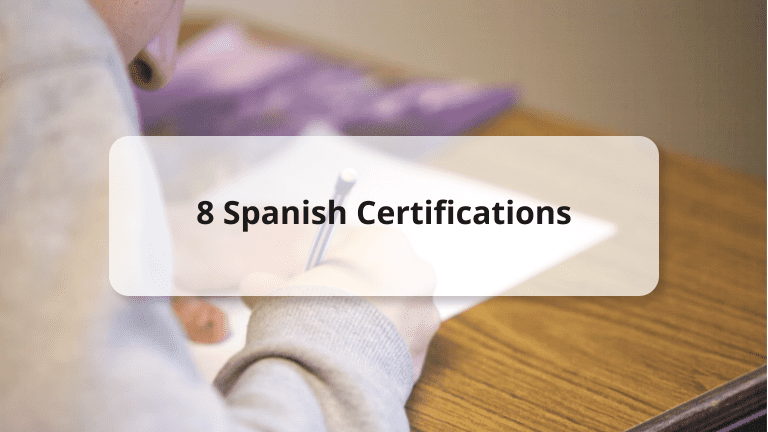Getting a Spanish certification has a mountain of benefits, for example, it will increase your chances of getting hired, help you study abroad in a Spanish-speaking country, or just enable you to better communicate in Spanish if you find yourself moving to a Spanish-speaking country! It is also a good idea since Spanish is one of the most spoken languages in the world.
When you figure out how to learn Spanish and get to a certain level of fluency, it is then time to become certified! Below we have listed 8 Spanish certification exams, with details on all you need to know about each test. Struggling to study for the exam? We have also listed some handy tips and tricks to make your studying journey a bit easier.
Table of Contents
Common European Framework of Reference for Languages (CEFR) levels
When finding ways to learn Spanish fast, it is clever to keep in mind how fluent you should be in order to get a certain certification. Before we get into the exams, let’s quickly go over what CEFR levels are and what it has to do with the exams.
The Common European Framework of Reference for Languages (CEFR) determines how well acquainted someone is with a language, in this case, how fluent you are in Spanish. CEFR comprises levels A to C. In more detail:
-
Level A1 – Breakthrough
Can communicate in basic Spanish. Simple interactions with the help of the listener.
-
Level A2 – Waystage
Understand sentences and commonly used expressions. Can describe familiar things in simple terms as well as introduce oneself to others with the use of simple phrases.
-
Level B1 – Threshold
You can hold conversations for a longer time. Can express opinions and discuss a broad range of topics.
-
Level B2 – Vantage
Interact fluently with others. Have the ability to discuss complex and abstract topics.
-
Level C1 – Effective Operational Proficiency
Can flexibly communicate without difficulty. The person can recognize and correct grammatical errors. The person can teach others how to speak Spanish.
-
Level C2 – Mastery
Understand everything and can express oneself with precision. An expert speaker.
8 Spanish Certification exams

1. Diplomas of Spanish as a Foreign Language (DELE)
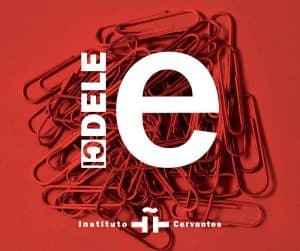
DELE Spanish diplomas are internationally recognized titles that certify your fluency in Spanish. You get these diplomas by taking a DELE exam granted by Spain’s Ministry of Education, Culture, and Sport.
Suitable for: Those seeking visas and citizenship, working professionals, and students who completed their tertiary education.
The Spanish diplomas are divided into all CEFR levels (A1-C2).
The exam itself is out of 100 marks. There are also two exams specifically for young learners between 11 and 17 years old. You can partake in any level since higher levels don’t have prerequisites, provided you are at the correct level of fluency. The great thing is that these certifications don’t expire!
The exam consists of 4 parts:
- Reading comprehension
- Written expression and interaction
- Listening comprehension
- Oral expression and interaction
You can sign up for the DELE exam online (only if you’re going to take the exam in Spain) or personally in a center where the exam is held in most countries.
2. Certificate of Use of Language in Spanish (CELU)
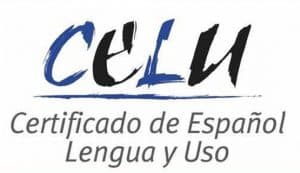
CELU is a proficiency test for Spanish as a foreign language. The CELU examination is officially acknowledged by the Ministry of Education and is held by the Ministry of Foreign Affairs and Worship of Argentina. This certificate is recognized in Argentina, Brazil, China, and Italy.
Suitable for: Working professionals and students who completed their tertiary education.
The certificate is only available for CEFR levels B1, B2, and C1 and doesn’t expire
The exam is graded on a scale from “Good” to “Excellent” and is divided into two sections; verbal and written sections. This exam does not take grammatical structure into account. It is usually held in June and November and since 2020, you can take the CELU exam online.
3. The European Language Certificate (TELC)

Issued by TELC GmbH & the Association of Language Testers in Europe (ALTE).
Suitable for: Those wanting citizenship and visas, working professionals, and students who completed their tertiary education.
The certification is only available for CEFR levels A1 to B2, but there is an advanced certification for scholars (TELC Español A1, A2, B1, and B2 Escuela). This certification doesn’t expire and you can partake in any level since higher levels don’t have prerequisites.
The exam is out of 100 points, with a passing score being 60. Mock examinations are readily available to give you an idea about the test structure, the rating criteria, the marks needed to pass, and the exam procedure. This exam is not available online and must be written at one of TELC’s examination centers, which is available in most countries.
4. Standards-Based Assessment and Measurement of Proficiency (STAMP)

Curated by Avant, these proficiency tests are aligned with the ACTFL Proficiency Guidelines.
Suitable for: Those wanting college credit, who wish to apply for a scholarship/study abroad, and working professionals.
These tests allow you to qualify for the Global Seal of Biliteracy, which enables you to showcase your language skills to any school or employer across state lines and national borders. It will never expire.
STAMP works a bit differently from CEFR. The assessments vary by skills assessed and the age/ school grade level:
- STAMP 4Se:
Reading, Writing, Listening, and Speaking. Designed for elementary school learners ages six through 12.
- STAMP 4S:
Reading, Writing, Listening, and Speaking. Designed for learners ages 13 through adult.
- STAMP 3S:
Reading, Writing, and Speaking. Designed for learners ages 13 through adult.
- STAMP WS:
Writing and Speaking skills are designed for learners ages 13 through adult. These assessments will allow you to qualify for the Functional and Working Fluency Global Seal of Biliteracy credentials.
These assessments can be written online while being remotely monitored by a human proctor.
5. Oral Proficiency Interview in Spanish (OPI)

An official language certification from ACTFL curated by LTI.
Suitable for: Those wanting college credit, who wish to apply for a scholarship/study abroad, and working professionals.
This exam is actually not a traditional exam. This test is done with a 15 to a 30-minute telephone conversation between a certified ACTFL tester (who follows a strict protocol) and the person who wishes to gain this certification. This test resembles a simple conversation.
There are many different certifications that can be given based on your needs and this certification expires within a four-year period.
In this way, your ability to speak Spanish, from your strengths (known as “floor”) to your weaknesses (known as “ceiling”) over a variety of topics, is tested and rated against the proficiency levels described in ACTFL Proficiency.
The test has four phases:
- Warm-up
- Level checks
- Probes
- Wind-down
The tester will rate your performance between “Novice” and “Superior” on the ACTFL scale, an ILR OPI will rate between ILR 0 (No Proficiency) and ILR 5 (Functionally Native), and a CEFR OPI reports a rating between A1 and C2.
6. European Consortium for the Certificate of Attainment in Modern Languages (ECL)
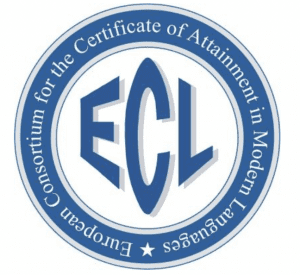
ECL is curated by the Association of Language Testers in Europe (ALTE).
Suitable for: Visa seekers and professionals.
It is a general language exam that doesn’t target a certain age group, country, profession, or culture. You must be older than 14, though. Certificates range from A2, B1-2, and C1 on the CEFR scale and expire after 3 years. You can partake in any level since higher levels don’t have prerequisites.
The exam comprises a written and oral exam which is judged based on:
- Formal accuracy
Morphology and syntax.
- Accuracy
Test construction and spelling/pronunciation.
- Vocabulary
Range and activation
- Style
Pragmatic and sociolinguistic aspects
- Communicative effectiveness
Adequate task completion
The exam itself is out of 100 points with a passing mark of 60. The exam can’t be taken online and must be taken at a designated center.
7. Servicio Internacional de Evaluación de la Lengua Española (SIELE)
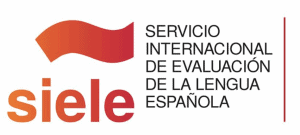
The most administered and recognized Spanish proficiency certificate in the world.
Suitable for: Working professionals, and students who completed their tertiary education.
The certification is divided into A1-2, B1-1, and C1 CEFR levels and is only valid for five years. You can partake in any level since higher levels don’t have prerequisites.
There are many types of exams:
- Listening only
- Writing only
- Speaking only
- SIELE Global
An exam that comprises all four language skill sets (Listening, writing, speaking, and reading) in a single test. This test is scored from 0 to 100.
The other tests are out of 250 points. There are no prerequisites and you can take whatever test you want.
You can book your test at your convenience and also take it online.
8. Constitutional and Sociocultural Aspects of Spain (CCSE)
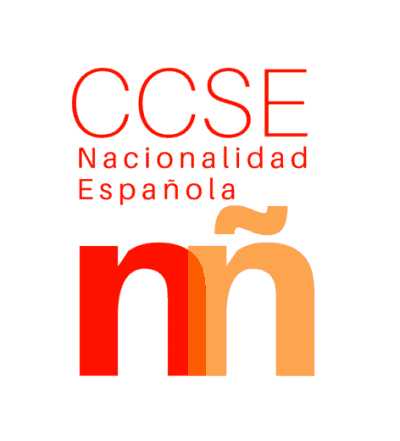
Not a language certification, but important nonetheless. This exam tests your knowledge of the Spanish Constitution and different aspects of Spanish life and culture.
Suitable for: If you are seeking citizenship. It is only valid for four years.
The exam consists of 25 closed-ended answer questions with 15 being the passing score and is divided into two parts; Spanish Government, law and citizenship, and then Spanish culture, history, and society.
This exam is available in every Spanish embassy abroad and by accredited centers by the Instituto Cervantes in Spain.
Tips on how to ace your Spanish exam!

How long it takes to learn Spanish depends on many things, where you come from, and what languages you speak.
1. Getting an online tutor

Whether you are starting out or just need a refresher, learning from a professional is proven to be one of the best ways to quickly grasp the Spanish language or an individual topic. It saves time, and the quality of how you speak the language will be much higher. You can find said tutor right here at AmazingTalker! AmazingTalker offers a broad range of professional online Spanish tutors. There are also online Spanish courses that will help you reach your desired level of fluency. You can even customize a course to suit your needs. You will be well prepared for the exams with AmazingTalker’s tutors!
2. Using Flashcards
Creating and using Flashcards in your daily learning routine is a good way to build up a memory of phrases and words. It’s also an excellent tactic to use old flashcards to go over some basic rules when you are further down the line just so you don’t forget the foundation of the Spanish language.
3. Listening to podcasts

Listening to podcasts that help you learn Spanish is a rather nice way to develop your pronunciation of Spanish words and speaking skills since you are listening to a native speaker or someone fluent in it. Since podcasts have become rather popular over the years, you are sure to find one that piques your interest.
4. Immersing yourself in that language
To immerse yourself in Spanish you’d need to think about what you enjoy doing! If reading is your style, pick up a book that is written in Spanish. If you are more of a music fan, go find some Spanish music in the genre of your choosing. Maybe Binge-watching a Spanish series, watching a Spanish movie, or playing a Spanish video game is more your speed. Incorporate Spanish in everything that you do! You will learn basic phrases and how to pronounce words all while being entertained.
5. Spaced repetition
A method that helps you commit words and phrases to memory. You would study new and hard words and phrases every day while taking a “break” from re-learning those words and phrases that you found to be easy. You would then go through these easy words and phrases a few days after learning them– this way you learn all that you need to learn and not waste time revising the easy stuff every time you study. These “breaks” should become longer as time goes on, and increasingly harder words or phrases should be added to your learning pile as time goes on.
6. Checking examples of exams and timing yourself
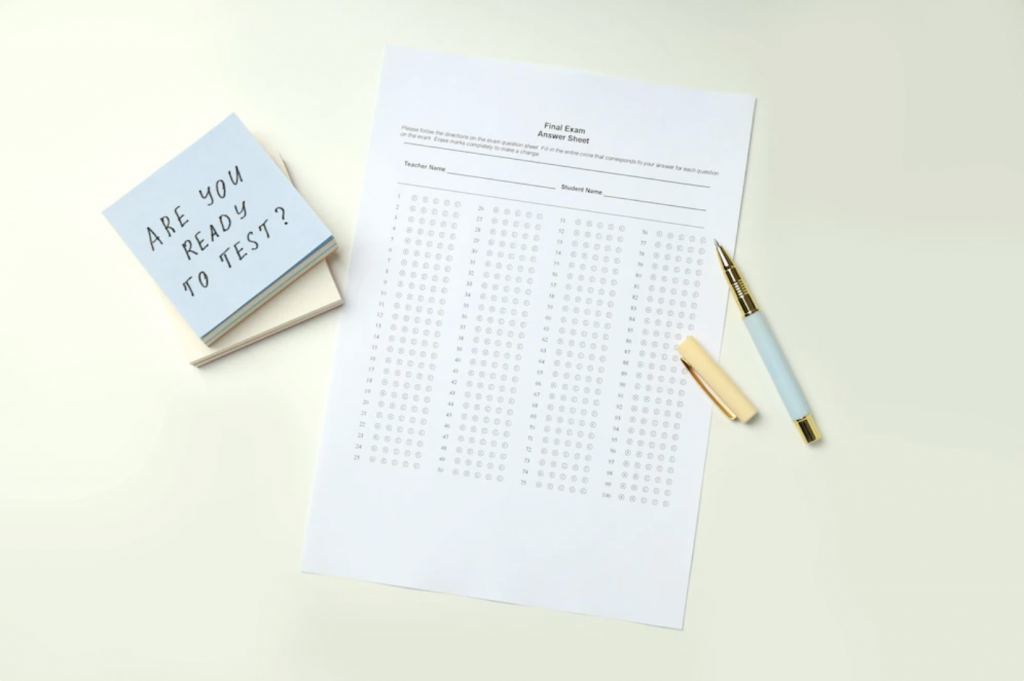
Doing exam examples or mock tests can help you understand what type of questions the exam will hold, how the test will be marked, and which content holds the most weight. Knowing this, you can plan your study schedule accordingly and be better prepared since you know what to expect. Timing yourself while taking these tests can help you see which parts of the content you struggle with the most, as such, you can spend more time on this and improve!
Buena suerte (good luck)!
Getting the right kind of Spanish certification will indeed provide you with a lot of benefits. It should be considered a priority!
Of course, when you want to get certified in any language before you can even write these exams, you must have some fluency! As mentioned before, getting an online tutor to help you reach your desired fluency is a surefire way to do so quickly and correctly. At AmazingTalker, not only do we have amazing Spanish tutors, but a wide variety of language tutors! Courses are readily available to help you ace these exams. All of this and more at AmazingTalker!
